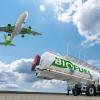
A new working group of the Earth Commission, comprising renowned scientists from institutions around the world including IIASA, will investigate future pathways of how humanity might develop sustainably to ensure a safe and just world for all.
The current COVID-19 crisis is making it clearer than ever that the state of our planet is a result of dynamic interactions between human and natural systems. In the Anthropocene, where humans have by far the largest impact on the planet, setting targets to guide our interactions with nature is an important dimension of global sustainable development.
To address these issues, a group of scientists from leading institutions around the world, including from IIASA, set out to synthesize the science to underpin such targets.
In late April, the Earth Commission, which is part of the Global Commons Alliance, a platform aiming to transform the global economy so that society can prosper on a stable and resilient planet, took an important step towards this goal, by establishing its first working group, the Earth and Human System Modeling Intercomparison Project (EHSMIP). The international group of renowned scientists led by Nebojsa Nakicenovic, an emeritus scholar at IIASA, and Govindasamy Bala from the Indian Institute of Sciences, are all active in world leading modeling initiatives such as the Intergovernmental Panel on Climate Change, the Intergovernmental Science-Policy Platform on Biodiversity and Ecosystem Services, The World in 2050, and Future Earth’s global research project Analysis, Integration and Modeling of the Earth System.
“There is strong evidence that current developments might push us beyond the boundaries of the Earth system, where the Earth system services we all depend on are no longer functional,” explains Nakicenovic. “The good news is that we have now gathered a dream team – we have some of the world’s leading modelers in this group. A major contribution will be to build the scientific community and the general understanding of how important this is for humanity.”
The work will build on both Earth system models, which include climate and other parts of the biosphere, and integrated assessment models that integrate natural, socioeconomic, and other human systems.
“Instead of developing new models, we will build on existing approaches and focus on interrelations and feedbacks across Earth and human systems. Our project will attempt to capture these interactions and identify the thresholds or targets in biophysical components of the Earth system for maintaining a safe and resilient planet in the coming years,” adds Bala.
To determine where the limits are – where the Earth system will no longer be able to support stable and just human societies – the group will investigate future pathways of how humanity might develop. A number of plausible pathways that would push the systems beyond their critical functionality, into a domain that is no longer sustainable, will be tested. The work group’s work will be an important contribution to the Earth Commission’s synthesis of science to underpin the setting of science-based targets.
The working group consists of four Earth Commission members and seven external scientists, including IIASA Energy Program Director Keywan Riahi. The scientific secretariat of the working group will be jointly hosted by IIASA, Potsdam Institute for Climate Impact Research (PIK), and University of Exeter.
“Through this work we will be able to better understand critical boundaries and trade-offs of human activities and which direction we need to go in order to maintain environmental and social stability at the planetary scale,” Riahi concludes.
Adapted from an announcement prepared by Future Earth.
Earth and Human System Intercomparison Project
Working group co-leads:
Govindasamy Bala, Indian Institute of Science
Nebojsa Nakicenovic, IIASA
Members:
Kristie Ebi, University of Washington
Peng Gong, Tsinghua University
Tim Lenton, University of Exeter
Ricarda Winkelman, Potsdam Institute for Climate Impact Research
Long Cao, Zhejiang University
Peter Cox, University of Exeter
Pierre Friedlingstein, University of Exeter
Patricia Pinho, University of Sao Paulo
Keywan Riahi, IIASA
Maisa Rojas Corradi, Universidad de Chile
Detlef van Vuuren, PBL Netherlands Environmental Assessment Agency
News

22 July 2024
Are sustainable aviation fuels truly sustainable?

17 July 2024
Forests endure as carbon sink despite regional pressures

16 July 2024
